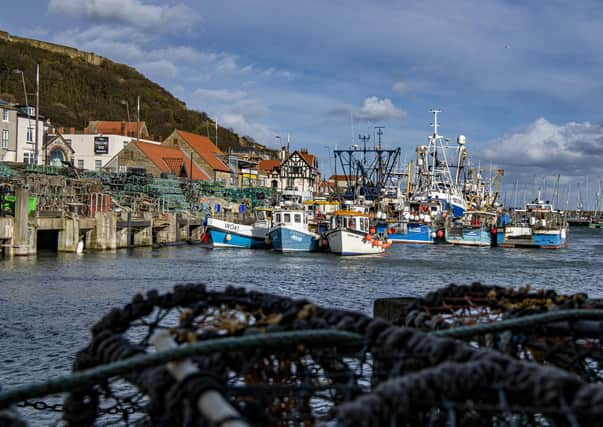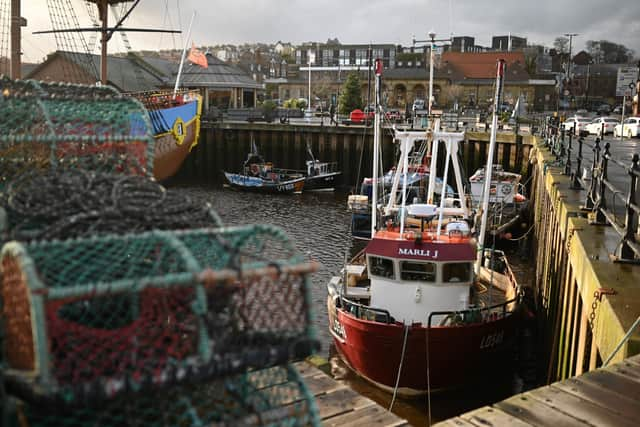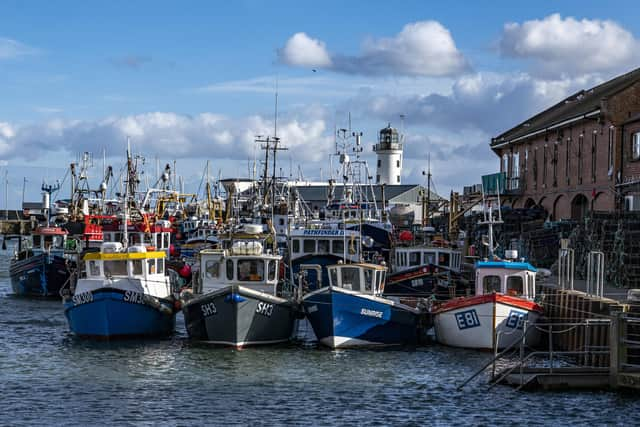Buy local to help Yorkshire fishermen through crisis – GP Taylor


Since joining the European Union, that number slowly declined. Outrageously, as our fishing fleet suffered, European fishing increased.
I remember watching a foreign fishing vessel dredging for scallops. This vast ship scraped the sea bed and ploughed up whatever was in its path. Later, I spoke to a diver who went to inspect the damage. All he said was that it was complete carnage, as if a motorway had been scoured across the sea.
Advertisement
Hide AdAdvertisement
Hide AdDuring our time in the EU, a single Dutch trawler had the right to catch 23 per cent of England’s entire fishing quota. In comparison, all of our small inshore fishing fleet for the whole of England is given four per cent of the quota.


European fishermen took 173 times more herring, 45 times more whiting, 16 times more mackerel and 14 times more haddock and cod out of our waters than our own fishermen did.
We need urgent action to redistribute the fishing quota to deliver a fairer deal for smaller boats. The ‘Rich List’ owners of the majority of fishing rights should have them taken back from them and laws made so that fishing quotas can no longer be sold to the highest bidder. There has to be a level playing field for all boats and fish should no longer be seen as a financial asset to be readily exploited.
The current quota system is neither good for fish stocks or for the thousands of women and men in this country who earn a precarious living from catching fish. Despite having the best fishing waters in Europe, something which the EU still wanted to plunder post Brexit, we import more fish than we export.
Advertisement
Hide AdAdvertisement
Hide AdFish is an important part of a good diet and is healthier than red meat. Stocks around the coast have to be managed properly, but even so, freshly caught local seafood is a great addition to any table. It is, therefore, of great importance that we, as a county, start to support our local fishermen and catch sellers.


Buying fish locally is the key. When you do, ask where the fish are from. Some vendors will even be able to tell you the name of the boat that caught them. Sadly, even at the harbour-side eateries in Scarborough, you can find fish that has been landed at Peterhead in Scotland – that isn’t very local. It’s a journey of 376 miles. This is not environmentally friendly.
Locally caught fish is more sustainable for the sea and is often caught by solo or double crewed boats. It is fresher than anything bought from a supermarket and you can get the cut you want and not just what the shop has on offer.
Your local fishmonger will have more variety, often including species that are underutilised. They’ll have an extensive knowledge of the fish itself and will be able to tell you the best way to prepare and cook the food.
Advertisement
Hide AdAdvertisement
Hide AdBy eating lesser known species, you are relieving the pressure on overfished populations. Shopping locally also puts money back into the economy where you live. It keeps the supply chain short and you will know that the boats in the harbour are putting the fish on your plate.
Due to Covid, the fishing industry has been badly hit. Restaurants that took a lot of coastal fish were closed and sales declined sharply. This was also compounded by the EU making it harder for British fishermen to export their catches.
It is even more important at this time for us all to support these valued members of our coastal communities. It is sad that those involved in the industry cannot afford to live near to the ports they fish from. The traditional houses once occupied by their ancestors have all been bought up by second-homers who have pushed up house prices beyond the means of locals.
If the Government wanted to really support sea fishers, then they should bring in policies to help them to be able to live locally with low rents and affordable housing for those with jobs linked to fishing.
Advertisement
Hide AdAdvertisement
Hide AdIt is important that the welfare of fishermen is taken seriously. Fishing is an ancient and honourable profession and ingrained in our maritime culture. It is an important part of the history of Yorkshire and those carrying on the craft should be supported by us all.
Young people should be encouraged to take up the profession and be given grants to do so. Money should be made available for them to buy boats and gear. Any harbour fees and landing costs should be scrapped for fishing boats.
Now that we are finally out of the EU, British fishermen should have the right to take back our territorial waters and do so in an environmentally and sustainable way. Their place in our communities is very fragile and balanced on a financial knifepoint. If we still want to see fishing boats in our harbours, then it is incumbent on us all to do as much as we can to buy local fish caught in the waters off our Yorkshire coast.
GP Taylor is an author and broadcaster. He lives in Whitby.
Advertisement
Hide AdAdvertisement
Hide AdSupport The Yorkshire Post and become a subscriber today. Your subscription will help us to continue to bring quality news to the people of Yorkshire. In return, you’ll see fewer ads on site, get free access to our app and receive exclusive members-only offers. Click here to subscribe.
Comment Guidelines
National World encourages reader discussion on our stories. User feedback, insights and back-and-forth exchanges add a rich layer of context to reporting. Please review our Community Guidelines before commenting.